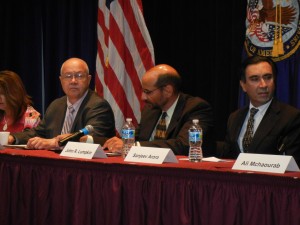
Robert Petzel, under secretary for Health in the Department of Veterans Affairs, John Lumpkin, senior vice president and director of the health care group at the Robert Wood Johnson Foundation and Dr. Sanjeev Arora, leader of Project ECHO discuss the expansion of a VA health care program aimed to bring specialty care to veterans in underserved areas.
Veterans in rural communities may have more access to specialized health care under an expansion of a physician education program announced Wednesday by the Veterans Affairs Department.
The program aims to improve veterans’ care in four areas: hepatitis C, congestive heart failure, diabetes mellitus, and chronic pain management.
“It is difficult to bring specialty care, and best practices in specialty care, into these rural areas,” said Robert Petzel, VA’s undersecretary for health. “Studies show that compared to urban veterans, rural and highly rural veterans have lower health-related quality of life scores and a higher prevalence of physical illness.”
VA hopes to change that with a systemwide adoption of a program called Specialty Care Access Network-Extension for Community Health Care Outcomes — or SCAN-ECHO — through which specialty health care providers educate primary care doctors and nurses so they can deliver the same level of care in their communities. The training will be delivered remotely, through weekly video teleconferencing clinics.
SCAN-ECHO is currently available at only 11 VA centers, some in urban areas, each of which was provided with $1.2 million per year to fund the initiative, said Dr. Rajiv Jain, chief of VA’s patient care services office.
Jacqueline Suppan, a clinical nurse specialist in Canton, Ohio, who has participated in the SCAN-ECHO program, said the program taught her a great deal about chronic pain and has allowed her to better understand the needs of her patients.
The VA program is based on Project ECHO, a video teleconferencing training program for health care providers started in 2003 by Dr. Sanjeev Arora, a physician at the University of New Mexico Hospital.
With millions of veterans living in rural communities, there is a strong need for this program in the VA health care system, Petzel said. As more active-duty service members return from Afghanistan, the number of veterans in need will continue to grow, he added.
The VA medical centers already using the SCAN-ECHO model have shown improvement among the health care practices of the primary care physicians, said Arora, who is working with VA on the program. He noted a report from 2011 that showed primary care providers who received training to treat hepatitis C were able to cure the disease at the same rate as the academic medical specialists at the University of New Mexico.
“We have shown that as we do this over time, a very dramatic improvement occurs in the self-efficacy of the primary care clinician. They feel they’ve gained the knowledge, their professional satisfaction goes up and they feel their practice gets transformed,” he said.
